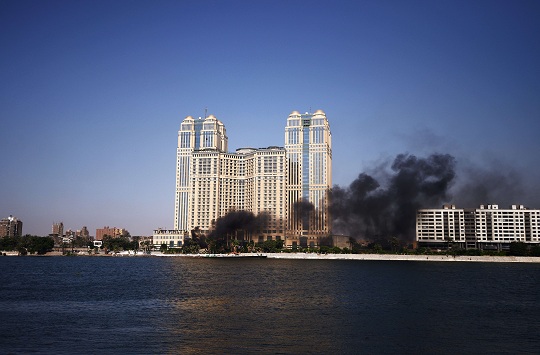Three Cairo University students and a photographer were arrested on Sunday after they stood outside a Giza court to show their solidarity with other students who have been arrested.
Student Mohamed Khaled, known as “Kazem”, and photojournalist Mohamed Abou Al-Fadl were released after being detained at the Giza Security Directorate for several hours, while students Mohamed Ahmed and Islam Hamid remained in police custody Monday after being referred to the prosecution for unlawful assembly, said Amr Imam, attorney for the human rights group the Association for Free Thought and Expression (AFTE).
Imam said he sent a telegraph to both Interior Minister Mohamed Ibrahim and the Giza Security Directorate’s chief investigator Ahmed Dessouki protesting the charges against the students.
The Sunday arrest comes amid recent violence on Egyptian university campuses, including bombings, clashes, and arrests.
On 2 April three bombs were detonated outside the wall of the Cairo University Faculty of Engineering, killing Tarek El-Mergawy, the director of Western Giza Investigation, and injuring five other police officers.
The explosions prompted a decision the following day by the Cairo University Board of Deans to allow police officers on campus, pledging the administration’s support, reported state-run Al-Ahram.
In a Monday statement AFTE strongly criticised the administration’s move to allow police on campus, calling it “a new attack on the independence of the university”, and a violation of the law.
AFTE said the decision was “hasty”, and that it “threatens the lives of students, faculty and university employees.”
AFTE called for Cairo University to speedily “rescind” the decision, and said that “it cannot accept the conversion of universities into military barracks” or support violence against students.
On 31 March two students were shot dead at Al-Azhar University as interior ministry forces entered campus to suppress protests, which have occurred almost daily at the university since the beginning of the school year.
In February, the Supreme Council of Universities signed a protocol with the Ministry of Interior to secure university campuses, authorising security forces to be present outside universities and only interfere on campuses with the permission of university chairmen.
Until 2010, the Ministry of Interior was responsible for providing Homeland Security personnel to secure universities. In 2010, the Supreme Administrative Court banned this decision, establishing “administrative” university security. The decision came into effect after the January 2011 uprising.

